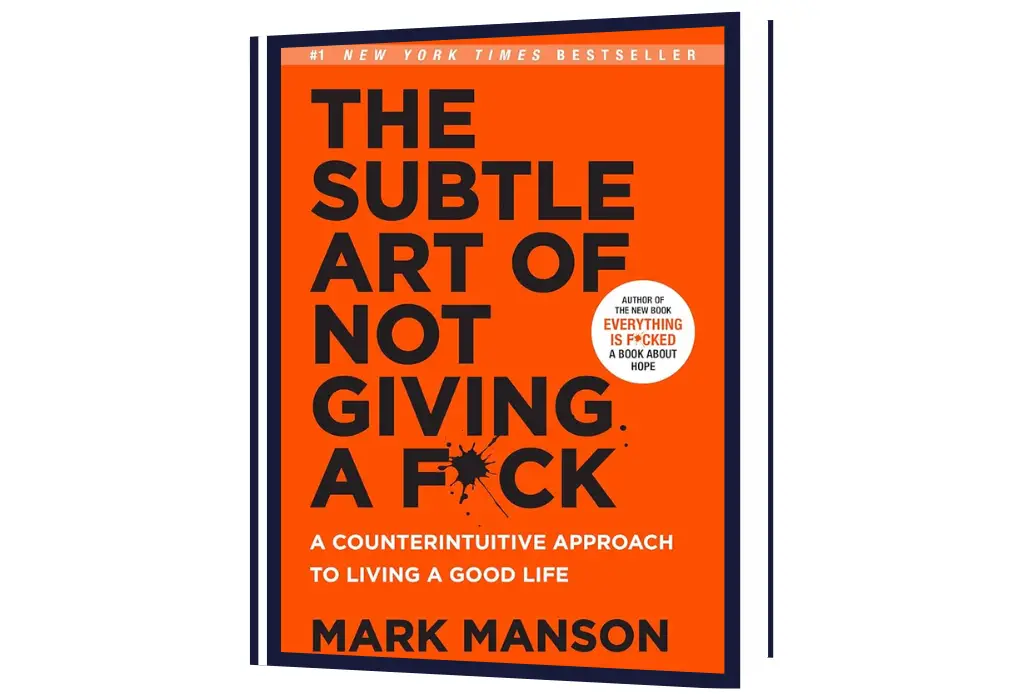The Subtle Art of Not Giving a Fck* by Mark Manson is a self-help book that challenges conventional wisdom about what leads to happiness and fulfillment. Instead of promising formulas for endless positivity and success, Manson presents a more pragmatic, counterintuitive approach to life, where embracing limitations, accepting failure, and choosing what to care about lead to more genuine contentment. His tone is irreverent and direct, making complex psychological concepts approachable and digestible for the reader.
Chapter 1: Don’t Try
The book begins by subverting a core tenet of most self-help books: the idea that constantly striving for more—more happiness, more success, more love—leads to a better life. Manson argues that this pursuit is actually the source of much dissatisfaction. Constantly trying to improve yourself implies that you’re not good enough to begin with, which leads to a cycle of never being satisfied.
Manson introduces the idea of “The Feedback Loop from Hell,” where we feel bad about feeling bad, creating a loop of negative emotions that reinforce each other. Instead of trying to avoid pain or discomfort, he suggests we accept that life will have its share of suffering and difficulties, and we should stop trying so hard to always be happy.
Key takeaway: The desire for more positive experiences is itself a negative experience, and paradoxically, accepting negative experiences can be a positive experience.
Chapter 2: Happiness Is a Problem
In this chapter, Manson argues that happiness is not something that can be permanently achieved or pursued. Instead, happiness arises from solving problems. The idea is not to eliminate problems from our lives but to choose the types of problems we are willing to confront and solve.
He emphasizes the importance of facing challenges and working through them, rather than avoiding them. The narrative that we should be perpetually happy leads to unrealistic expectations, which in turn create disappointment and unhappiness. Life is full of struggles, and choosing the right kind of struggle is what leads to a meaningful existence.
Key takeaway: Happiness comes from solving problems. The key is not to avoid problems but to choose meaningful ones.
Chapter 3: You Are Not Special
Manson takes aim at the cultural notion that everyone is unique and destined for greatness. This idea has led to what he calls “The Tyranny of Exceptionalism,” where people feel they need to stand out or be special in order to be happy or worthy. He argues that the idea that we are all special has led to entitlement, which is harmful. Entitlement makes people expect that life should cater to them, and when it doesn’t, they feel victimized.
Instead of focusing on being special, Manson suggests that we focus on what truly matters to us, rather than trying to live up to societal expectations of greatness. Life is not about constantly achieving or outperforming others, but about finding fulfillment in the everyday, ordinary experiences that are meaningful to us.
Key takeaway: You’re not special, and that’s okay. Accepting your ordinariness can free you from unrealistic expectations and lead to a more fulfilling life.
Chapter 4: The Value of Suffering
In this chapter, Manson introduces the concept of values and their connection to suffering. He argues that much of our suffering stems from poor values. For example, if your value is to be loved by everyone, you will suffer every time someone disapproves of you. On the other hand, if you value honesty and authenticity, you will prioritize those qualities over seeking approval, even if it leads to rejection.
Manson emphasizes the importance of choosing better values—ones that are reality-based, constructive, and under your control. Values such as honesty, creativity, and humility are better than values like material success or being liked by everyone.
Key takeaway: Suffering is inevitable, but the cause of suffering is often rooted in our values. By choosing better values, we can reduce unnecessary suffering.
Chapter 5: You’re Always Choosing
Here, Manson highlights the importance of responsibility and the choices we make in life. While we cannot always control what happens to us, we are always responsible for how we respond to it. He introduces the concept of “The Responsibility/Fault Fallacy,” where people mistake responsibility for fault. Just because something isn’t your fault doesn’t mean you’re not responsible for dealing with it.
He shares examples of people who have endured significant hardships but took responsibility for their responses, turning difficult circumstances into personal growth. This chapter emphasizes that we have more control over our lives than we often think, and that by taking responsibility for our choices, we can empower ourselves to live more fulfilling lives.
Key takeaway: Life is full of challenges, but we are responsible for how we respond to them. Taking responsibility for your choices leads to empowerment.
Chapter 6: You’re Wrong About Everything (But So Am I)
Manson delves into the concept of uncertainty and the limits of our knowledge. He argues that much of our suffering comes from the desire to be right, to feel certain about things. However, our beliefs and perspectives are often flawed or incomplete. Instead of clinging to certainty, Manson suggests that we should embrace uncertainty, being open to new experiences and perspectives.
He advocates for the idea that being wrong is essential to growth. If we never admit we’re wrong, we can never improve. By acknowledging that we don’t have all the answers, we create space for learning and personal development.
Key takeaway: Embracing uncertainty and being willing to admit when we’re wrong is crucial for growth and self-improvement.
Chapter 7: Failure Is the Way Forward
In this chapter, Manson addresses the fear of failure, arguing that it’s an inevitable part of life and a key element of success. He discusses the “Do Something Principle,” which suggests that taking action, even if it’s small or imperfect, creates momentum and leads to further action. Rather than waiting for the perfect moment or motivation, just start doing something, and the process itself will create more opportunities for growth and improvement.
Failure should not be feared but embraced, as it provides valuable lessons. The people who are most successful are not those who avoid failure, but those who are willing to fail repeatedly and learn from their mistakes.
Key takeaway: Failure is an essential part of growth and success. Taking action, even small steps, leads to progress.
Chapter 8: The Importance of Saying No
Manson explores the idea of setting boundaries and learning to say no in order to focus on what truly matters. Many people struggle with saying no because they fear missing out or disappointing others. However, saying yes to everything often leads to burnout and a lack of focus on what’s truly important.
By saying no to things that don’t align with your values or priorities, you create space for the things that really matter. This chapter emphasizes the importance of making conscious choices about where to invest your time and energy, and being willing to let go of things that don’t serve you.
Key takeaway: Learning to say no is crucial for focusing on what truly matters. Setting boundaries helps you prioritize your values and well-being.
Chapter 9: …And Then You Die
The final chapter of the book addresses the ultimate reality: death. Manson argues that accepting the inevitability of death can lead to a more meaningful life. When we acknowledge our mortality, we can stop wasting time on trivial pursuits and focus on what truly matters to us.
Manson discusses the importance of legacy and how the fear of death can motivate us to live with purpose. He suggests that rather than avoiding thoughts of death, we should embrace them as a way to live more fully and authentically. By keeping death in mind, we can live with greater urgency and appreciation for the present moment.
Key takeaway: Embracing the reality of death can help us live more purposefully and authentically.
Conclusion
The Subtle Art of Not Giving a Fck* is a refreshing take on self-help, rejecting the relentless pursuit of happiness and perfection in favor of a more grounded, realistic approach to life. Manson encourages readers to focus on what truly matters, embrace discomfort and failure, and accept that life is full of challenges and limitations. By choosing better values and taking responsibility for our choices, we can live more meaningful, fulfilling lives.
The book’s irreverent tone, humor, and no-nonsense advice make it a compelling read for anyone looking to break free from societal expectations and find their own path to contentment. Instead of chasing constant positivity, Manson suggests that we should focus on what we truly care about and let go of the rest.







